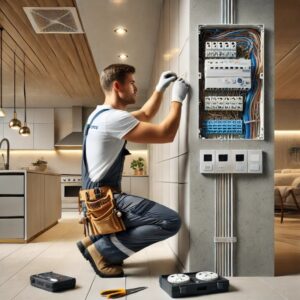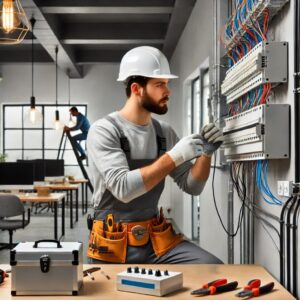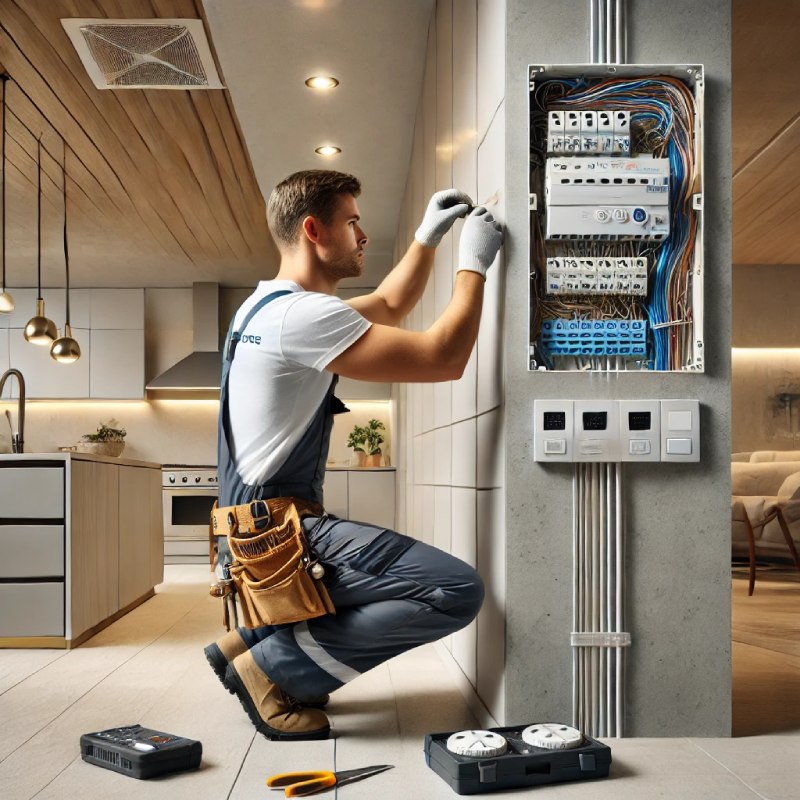Recognizing the signs of a circuit overload is crucial for preventing potential hazards and ensuring the safety of your home’s electrical system. Here are the key indicators that your circuit may be overloaded:
Flickering or Dimming Lights
One of the most common signs of an overloaded circuit is flickering or dimming lights. When a circuit overloads, it struggles to supply adequate power to all connected devices, causing lights to flicker or dim intermittently. Frequent occurrences indicate an overburdened circuit needing attention.
Frequent Circuit Breaker Trips
Circuit breakers are designed to protect your home by cutting off electrical flow when a circuit is overloaded. If you find yourself constantly resetting tripped breakers, it’s a clear sign that your electrical demand exceeds the circuit’s capacity. Frequent trips should not be ignored, as they indicate a persistent overload issue that needs addressing.
Analyzing Your Current Energy Consumption
Take a look at your energy bills over the past year to gauge your average consumption. This data is gold when sizing your solar system to match or exceed your needs.
Burning Odors from Outlets or Switches
A burning smell emanating from outlets or switches is a serious warning sign of an overloaded circuit. Overheating wires or electrical components often cause this odor, which can lead to melting insulation and potential electrical fires. If you detect any unusual smells, immediately turn off the power and consult a professional electrician.
Warm or Discolored Wall Plates
When circuits are overloaded, the excessive current can cause outlets and switch plates to become warm to the touch. In more severe cases, you might notice discoloration or scorch marks around these areas. These signs indicate that the electrical load is too high, and immediate action is needed to prevent further damage or fire risks.
Buzzing or Humming Sounds
Audible buzzing or humming sounds from your electrical panel, outlets, or switches can indicate an overloaded circuit. These noises result from the electrical current struggling to pass through the circuit, creating vibrations that manifest as sounds. Such noises should prompt an inspection by a qualified electrician to identify and rectify the issue.
Malfunctioning Appliances
Overloaded circuits can cause appliances and electronic devices to malfunction or operate inefficiently. If you notice that your appliances are not working correctly or are experiencing intermittent issues, it could be due to insufficient power supply caused by an overloaded circuit. Ensuring each appliance is connected to a suitable circuit can help maintain their proper function.
Recognizing these signs of circuit overload early can prevent more serious electrical issues and ensure the safety of your home. If you encounter any of these warning signals, it’s important to take action promptly and consult with a professional to address and resolve the underlying problems.
Summary
Understanding and addressing circuit overload risks are vital steps in maintaining a safe and efficient home electrical system. Recognizing signs like flickering lights, frequent breaker trips, burning odors, warm wall plates, buzzing sounds, and malfunctioning appliances helps you act promptly to prevent hazards.
Why Rising Sun Electrify is the Best Choice for Your Electrical Needs
At Rising Sun Electrify, we specialize in diagnosing and solving electrical issues, including circuit overloads. Our team of certified electricians brings expertise and professionalism to every job, ensuring that your home’s electrical system is safe, efficient, and capable of meeting your needs. We use the latest technologies and follow strict safety standards to deliver top-quality service.
The Benefits of Professional Electrical Services
By addressing circuit overload risks with professional help, you can enhance your home’s safety, protect your appliances, and improve overall electrical efficiency. Proper electrical load management not only reduces the risk of electrical fires but also ensures that your home’s electrical system operates smoothly and reliably.
Contact Rising Sun Electrify Today to learn more about how we can help you safeguard your home against circuit overload risks. Our expert services and dedication to customer satisfaction make us the ideal partner for all your electrical needs. Let us help you create a safer, more efficient home environment.
FAQs
What is a circuit overload?
A circuit overload happens when you connect too many devices or appliances to a single circuit, drawing more current than it can handle safely. This can cause the circuit breaker to trip or, in severe cases, lead to electrical fires.
What are the common signs of a circuit overload?
Common signs include flickering or dimming lights, frequent circuit breaker trips, burning odors from outlets or switches, warm or discolored wall plates, buzzing or humming sounds, and malfunctioning appliances.
How can I prevent circuit overloads in my home?
To prevent circuit overloads, distribute electrical loads evenly across multiple circuits, avoid overusing power strips and extension cords, upgrade your electrical panel if necessary, and have regular electrical inspections by a professional.
What should I do if I suspect a circuit overload?
If you suspect a circuit overload, reduce the number of devices connected to the circuit, check for any signs of damage, and consult a professional electrician to assess and resolve the issue.
Are frequent circuit breaker trips a sign of a serious problem?
Yes, frequent circuit breaker trips indicate that your electrical system is experiencing overloads or other issues. It’s important to have a professional electrician inspect your system to identify and fix the underlying problem.
How can Rising Sun Electrify help with circuit overload issues?
Rising Sun Electrify offers expert electrical services, including diagnosing and resolving circuit overload issues. Our certified electricians can upgrade your electrical system, ensure proper load distribution, and provide regular maintenance to keep your home safe and efficient.











